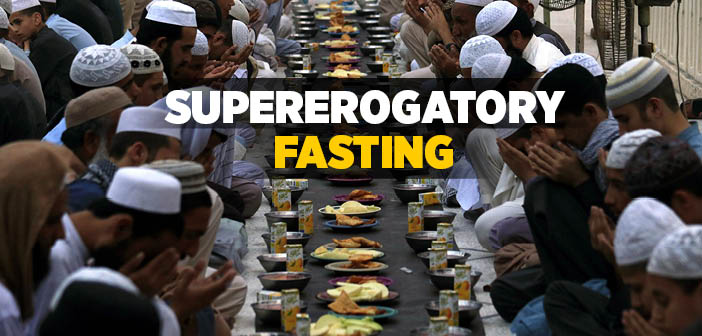What is supererogatory fasting?
This is the type of fasting observed by a believer by his free will, in addition to the obligatory fasting, to gain the pleasure of Allah. In this regard, Allah’s Messenger said, “Whosoever fasts a day in the cause of Allah, Allah shall put between him and the Fire a trench whose distance is like that between the heavens and the earth.”[1]
Fasting on the following days is accepted as supererogatory:
- Fasting in the Month of Ramadan, especially on the Day of Ashura and the days before and after it: One should try to fast in the month of Muharram as many days as possible. Fasting especially on the 9th, 10th and 11th days of the month of Ramadan or fasting on the 9th and 10th or fasting on the 10th and 11th is a Sunnah. According to a report narrated from Ibn ‘Abbas (r.a.), when Allah’s Messenger migrated to Medina, he saw that the Jews in Medina were fasting of the Day of Ashura (10th day of Muharram) and asked about it. He was told, “This is a good day, the day on which Allah rescued Bani Israel from their enemy. So, Moses fasted this day.” The Prophet (pbuh) said, “We have more claim over Moses than you.” So, the Prophet fasted on that day and ordered the Muslims to fast on that day.[2]
- Fasting on the First Days of Dhul Hijjah and especially on the Day of Arafa (9th day of Dhul Hijjah): It is recommended to fast nine days from the beginning of the month of Dhul Hijjah until the Sacrificial Festival (Eid al-Adha). Hafsa (r. anha) said, “There are four things which the Prophet never gave up: Fasting on the Day of ‘Ashura’, (fasting during) the ten days of Dhul Hijjah, (fasting) three days of each month, and praying two rak’ahs before the Dawn Prayer (Fajr).”[3]
It is recommended to fast especially on the 9th day of Dhul Hijjah. Allah’s Messenger (pbuh) said, “It is hoped from Allah that fasting on the Day of Arafa covers the sins for a year before and after it.”[4] This fasting is for those who are not performing the pilgrimage.
- Fasting six days in the month of Shawwal: The month after Ramadan is the month of Shawwal. It is stated in a hadith narrated from Abu Ayyub, “Whoever fasts Ramadan, then follows it with six from Shawwal, then that is (equal in reward) to fasting every day.”[5]
Muslim scholars interpreted the Prophet’s statement “to be equal in reward to fasting everyday” together with the verse “Whoever shall come [before Allah] with a good deed will gain ten times the like thereof!..” (al-An’am, 6: 160). They have multiplied thirty days of Ramadan and six days of Shawwal by ten and thus have reached the total number of three hundred and sixty days of the year. One can fast any six days of the month of Shawwal or in an uninterrupted succession during the same month.
- Fasting at the Beginning of the Month of Shaban: We are informed by the wives of our beloved Prophet (pbuh) that he would pay attention to fast at the beginning of the month of Shaban. Abdullah b. Abu Qubays narrated that he heard from Aisha (r. anha), “The month most liked by the Messenger of Allah (pbuh) for fasting was Sha’ban.”[6]
- Fasting in the Sacred (Haram) Months: Dhul Qa’dah, Dhul Hijjah, Muharram and Rajab are the sacred months. It is recommended to fast three days (by coinciding them with a Thursday, a Friday, and a Saturday) in each one of these sacred months.
- Fasting Three Days, especially 13th, 14th and 15th Days of a Lunar Month: Aisha (r. anha) reported that the Prophet (pbuh) would fast three days in every lunar month. According to a narration by Abu Dhar (r.a), Allah’s Messenger (pbuh) said, “When you fast three days in every month, fast the 13th, 14th and 15th days of the month.”[7] These days are also called “ayyam-i biyd (days of full moon).
- Fasting on Mondays and Thursdays: According to Usama b. Zayd (r.a.), Allah’s Messenger (pbuh) would fast on Mondays and Thursdays. When he was asked why he preferred these days, he (pbuh) said, “The deeds of the servants (of Allah) are presented (to Allah) on Monday and Thursday.”[8]
- Fasting like the Fasting of the Prophet David (pbuh): The most virtuous one among the supererogatory fasting types is to fast on alternate days. Allah’s Messenger (pbuh) said in this regard, “The best fasting in the eye of Allah is that of David, for he fasted one day, then broke his fast the next (he fasted on alternate days).” When Abdullah b. ‘Umar (r.a.) said, “I am capable of doing more than this”, the Prophet (pbuh) said, “This is the best in the eye of Allah.”[9]
[1] Al-Tirmidhi, Jihad, 3[2] Al-Bukhari, Sawm 69[3] Al-Nasai, Siyam 83[4] Ahmad b. Hanbal, V, 196[5] Al-Tirmidhi, Sawm 52[6] Abu Dawud, Sawm, 57[7] Al-Bukhari, Sawm 56, 58; Muslim, Siyam 181[8] Abu Dawud, Sawm 60[9] Muslim, Siyam, 192, 203
Source: Fiqh1 (According To The Shafi’i School Of Islamic Law), Erkam Publications





